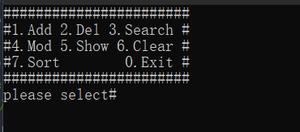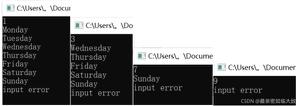C++语言实现线性表之数组实例
本文实例讲述了C++语言实现线性表之数组。分享给大家供大家参考。具体分析如下:
感觉用C++中的构造函数、析构函数等类的特点来描述一些数据结构更加易读,更加合理,便捷。但有一个问题,编译器不支持模板的分离编译,很不舒服
#include <iostream>
using namespace std;
template<class T>
class CArray
{
public:
CArray(const int &iMax);
CArray();
~CArray();
void Create(const int &iMax);
void Destroy();
void Print();
bool IsEmpty();
bool IsFull();
void Append(const T &data);
int GetLength();
int GetMax();
bool Delete(const int &pos);
bool Insert(const int &pos,const T &data);
void operator+=(const T &data);
private:
T *m_pArray;
int m_len;
int m_max;
void Reset();
};
template<class T>
CArray<T>::CArray(const int &iMax)
{
Create(iMax);
}
template<class T>
CArray<T>::~CArray()
{
Destroy();
}
template<class T>
void CArray<T>::Create(const int &iMax)
{
m_pArray = new T[iMax];
m_max = iMax;
m_len = 0;
memset(m_pArray,0,sizeof(m_pArray));
}
template<class T>
void CArray<T>::Destroy()
{
delete [] m_pArray;
}
template<class T>
void CArray<T>::Print()
{
if(IsEmpty())
{
cout<<"没有数据!"<<endl;
}
else
{
for(int ix =0 ; ix < m_len ; ++ix)
{
cout<<m_pArray[ix]<<",";
}
cout<<endl;
}
}
template<class T>
bool CArray<T>::IsEmpty()
{
if(0 == m_len)
{
return true;
}
else
{
return false;
}
}
template<class T>
bool CArray<T>::IsFull()
{
if(m_len == m_max)
{
Reset();
return false;
}
else
{
return false;
}
}
template<class T>
void CArray<T>::Append(const T &data)
{
if(!IsFull())
{
++m_len;
m_pArray[m_len - 1] = data;
}
}
template<class T>
int CArray<T>::GetLength()
{
return m_len;
}
template<class T>
bool CArray<T>::Delete(const int &pos)
{
if(pos > m_len || pos <= 0)
{
cout<<"位置不合法"<<endl;
return false;
}
for(int ix = pos - 1 ; ix < m_len - 1 ; ++ ix)
{
m_pArray[ix] = m_pArray[ix + 1];
}
--m_len;
return true;
}
template<class T>
void CArray<T>::operator+=(const T &data)
{
this->Append(data);
}
template<class T>
bool CArray<T>::Insert(const int &pos,const T &data)
{
if(IsFull())
{
return false;
}
else
{
for(int ix = m_len - 1 ; ix >= pos - 1 ; -- ix)
{
m_pArray[ix + 1] = m_pArray[ix];
}
m_pArray[pos - 1] = data;
++m_len;
return true;
}
}
template<class T>
CArray<T>::CArray()
{
Create(5);
}
template<class T>
void CArray<T>::Reset()
{
T *pT = new T[m_max * 2];
memset(pT,0,sizeof(pT));
for(int ix = 0 ; ix < m_len ; ++ ix)
{
pT[ix] = m_pArray[ix];
}
delete [] m_pArray;
m_pArray = pT;
m_max = m_max * 2;
}
template<class T>
int CArray<T>::GetMax()
{
return m_max;
}
希望本文所述对大家的C++程序设计有所帮助。
以上是 C++语言实现线性表之数组实例 的全部内容, 来源链接: utcz.com/z/315295.html







